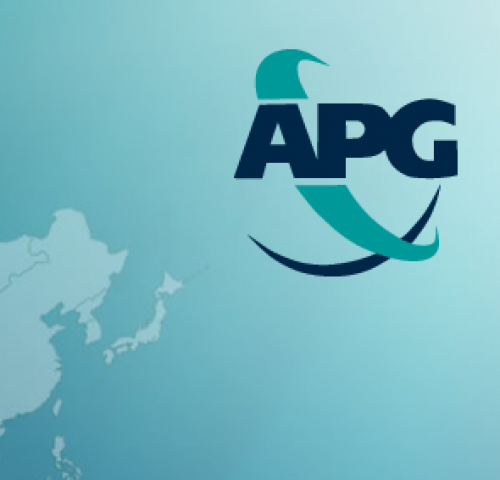Pakistan’s FATF compliance poor: APG report
Mutual Evaluation Report of the Asia Pacific Group says Pakistan compliant with only one of 40 recommendations

APG logo. PHOTO: APG
The APG on Money Laundering released its Mutual Evaluation report 10 days before the Financial Action Task Force’s plenary meeting, which is going to give its decision on Pakistan’s status on its grey list.
After the APG report, chances are high that Pakistan would be retained on the grey list during the FATF plenary meetings from October 13 to 18 in Paris.
The cut-off date for Pakistan to show improvement to APG was October 2018 and the Pakistani authorities insisted that they made a lot of progress during the past year. Lately, the Director-General of Military Operations has been given the overall responsibility for the implementation of FATF recommendations while Federal Minister for Economic Affairs Hammad Azhar is responsible for coordination from the civilian side.
The Mutual Evaluation Report of 2019 has not agreed with Pakistan’s assessment that it faces “medium” category risks of money laundering and terrorism financing.
In its National Risk Assessment report, Pakistan did not believe that money laundering and terrorism financing were high-risk category areas.
Contrary to the assessment by Pakistan that its overall terror financing risk assessment is “medium”, Pakistan faces significant risk of terror financing both from legitimate and illegitimate sources as well as weak or no, regulation and supervision of certain sectors such as hawala/hundi, NPOs and DNFBPs (Designated Non-Financial Businesses and Professions) and porous borders, according to the report.
“The terror financing cases are identified by a number of mechanisms but not via financial intelligence,” according to the report.
The report showed that out of FATF’s 40 recommendations on curbing money laundering and combating the financing of terrorism, Pakistan was fully compliant only on one. It was largely compliant on nine, partially compliant on 26 and non-compliant on four recommendations.
On the level of effectiveness of Pakistan’s AML/CFT, Pakistan was found moderately effective only on one benchmark while on the remaining nine its effectiveness was declared as low as of October 2018 cut-off date.
Due to these adverse findings, the APG has already decided to place Pakistan on its Expedited Enhanced Follow up reporting list.
The report underlined that Pakistan’s regulators – the State Bank of Pakistan and Securities and Exchange Commission of Pakistan – have very limited understating of the money laundering and terror financing regimes.
“Pakistan should adequately identify, assess and understand its money laundering/terror financing risks including transnational risks and risks associated with terrorist groups operating in Pakistan such as Da’esh, AQ, JuD, FiF, LeT, JeM and HQN, and this should be used to implement a comprehensive and coordinated risk-based approach to combating money laundering and terror financing,” according to the report.
Also terrorist groups operating in Pakistan are reported to include but not limited to, ISIS-Khorasan, Tehreek-e-Taliban Pakistan, Quetta Shura Taliban, Haqqani Network and Lashkar-e-Taiba (including its affiliates Jamaatud Dawa and Falah-i-Insaniat Foundation), which raise funds through a variety of means, including direct support, public fundraising, abuse of NPOs, and though criminal activities, it added.
The report said that corruption, drug trafficking, fraud, tax evasion, smuggling, human trafficking, and organised crime were major predicate offences to money laundering and areas of high risk.
But the APG applauded Pakistan’s efforts to combat corruption. “Corruption is endemic across Pakistan’s economy, although Pakistan is to be commended for its recent initiatives to prevent and detect corruption.”
The APG advised that Pakistan should significantly enhance the use of financial intelligence in money laundering, terror financing, and predicate crime cases, particularly the use of financial intelligence to target terrorist groups and higher- risk predicate crimes. It also sought improvement in asset confiscation that should commensurate with Pakistan’s money laundering and terror financing risks, including cross-border currency.
Pakistan’s capacity issues
“Competent authorities have varying levels of understanding of the country’s money laundering and terror financing risks, and the private sector has a mixed understanding of risks,” according to the report.
While Pakistan established a multi-agency approach to implementing its AML/CFT regime, it was not implementing a comprehensive and coordinated risk-based approach to combating money laundering and terror financing, it added.
For money laundering, there was no clear understanding among competent authorities, including LEAs. “Competent authorities are focused on predicate crimes and are unable to clearly differentiate money laundering from predicate offences which generate illicit proceeds.”
“For terrorism financing, Pakistani authorities have a mixed understanding of risk. Federal Investigation Agency has a low level of terror financing risk understanding, while provincial police, counter-terrorism departments (CTDs) have a better understanding of those risks within their provinces.
“The State Bank of Pakistan does not have a clear understanding of the money laundering and terror financing risks unique to the sectors it supervises,” stated the APG report.
The APG noted that some improvement in AML/CFT compliance was evident as a result of the SBP’s supervision but the value of monetary sanctions imposed was low.
There was little evidence that the SECP’s supervisory activity was improving AML/CFT behaviour. Pakistan Post, CDNS, and DNFBPs were not supervised for AML/CFT compliance.
“All non-banking financial companies (NBFCs) have a limited understanding of these risks and are in the initial stages of implementing a risk-based approach. DNFBPs have a poor understanding of money laundering and terror financing risks and are yet to start implementing a risk-based approach,” it added.
“Regarding statistics, the Financial Monitoring Unit (FMU) is legally required to maintain statistics. However, not all statistics are comprehensive or detailed, and in many instances, AML- and CFT–related statistics across a broad range of supervision, law enforcement and regulatory areas are contradictory or inconsistent.”
Also, Pakistan’s law enforcement efforts to address money laundering were not consistent with its risks.
Most banks and larger exchange companies had an adequate understanding of their AML/CFT obligations and had conducted internal money laundering and terror financing risk assessments, which underpinned a reasonable understanding of customer money laundering risk but not terror financing risk, according to the report.
All other financial institutions had limited understanding of their money laundering and terror financing risks; they were in a nascent stage of implementing the risk-based approach and internal controls; smaller entities lacked proper systems to identify Politically Exposed Persons (PEPs).
Pakistan had limited mitigating measures for legal persons and there was no supervisory oversight for AML/CFT purposes.
There were no measures in place to address the money laundering and terror financing risks posed by trusts, including foreign trusts, and waqfs in Pakistan, stated the report.
Reporting entities were required to obtain beneficial ownership information before entering into a business relationship.
Pakistan also had minor technical shortcomings in its framework for national coordination and minor technical shortcomings in its terror financing offence but fundamental improvements were needed in the investigation and prosecution of terror financing.
“The terrorism financing is not fully integrated into Pakistan’s broader counter-terrorism approach particularly at an operational level and in all provinces besides Punjab. Pakistan did not demonstrate it was employing other measures to disrupt terror financing where it was not practical to secure a terror financing conviction,” it added.



















COMMENTS
Comments are moderated and generally will be posted if they are on-topic and not abusive.
For more information, please see our Comments FAQ